Comunicat de presă – Lansare oficială a documentarului Izvoarele Unveiled în Ploiești
Comunicat de presă
23 Mai 2018
Premiera oficială a filmul documentar creat în cadrul proiectului Izvoarele Unveiled, ce poartă același nume de altfel, precum și lansarea paginii web discoverizvoarele.ro au avut loc în Ploiești la data de 23 Mai 2018. Voluntarii SEV din cadrul Curba de Cultură au povestit despre munca din spatele materialelor audio-vizuale, despre ce a însemnat pentru ei viața în România timp de un an și despre cum au comunicat cu oamenii din comuna Izvoarele. După vizionare filmului și explorarea paginii web dedicate comunei Izvoarele, participanții s-au putut delecta cu bunătăți tradiționale din comună precum și cu discuții interesante cu toată lumea prezentă despre cele vizionate.
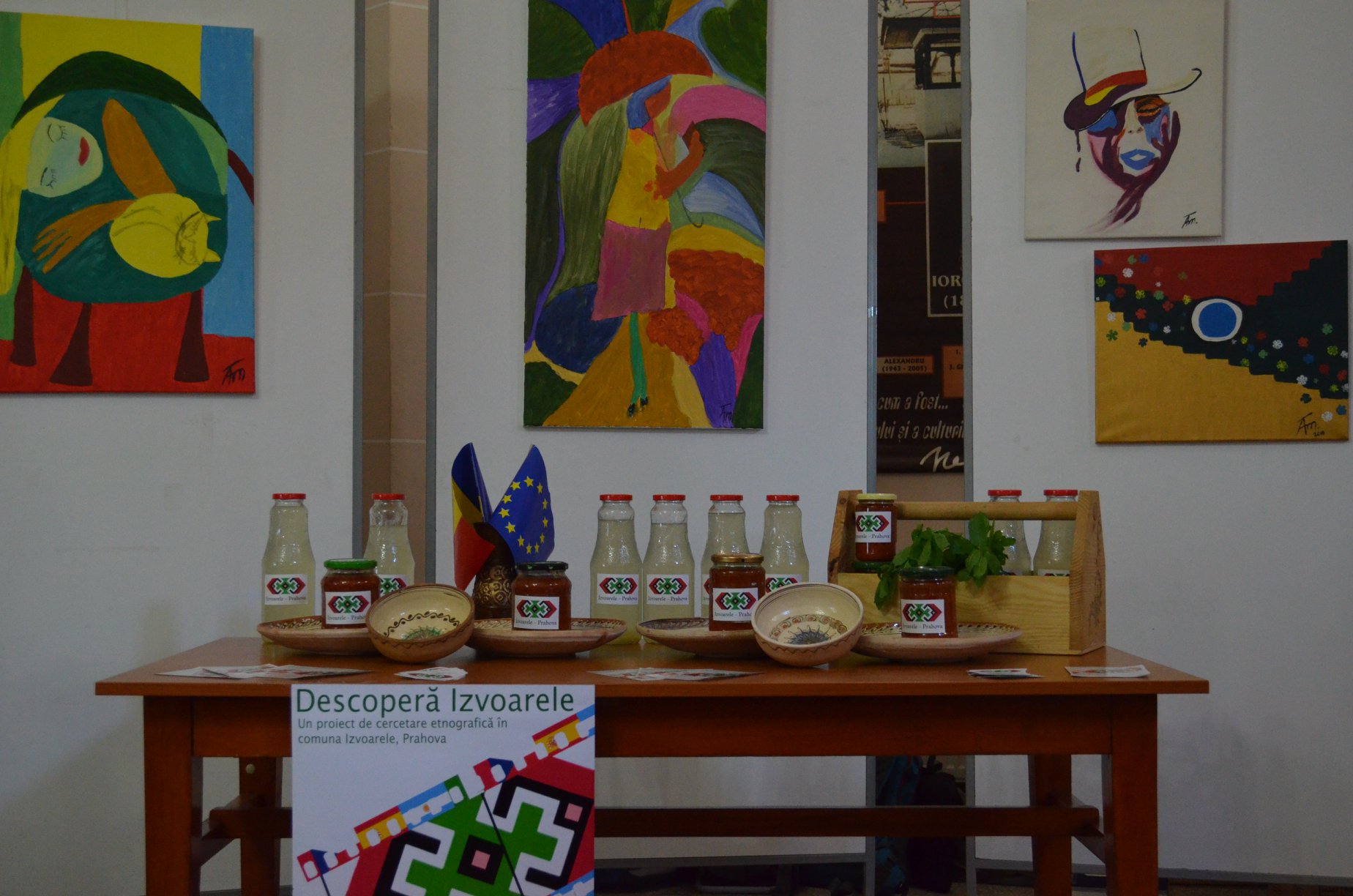
Lansarea filmului documentar Izvoarele Unveiled s-a desfășurat în cadrul unui eveniment găzduit de partenerii noștri de la Biblioteca Județeană Nicolae Iorga din Palatul Culturii din Ploiești. Voluntarii au povestit despre munca din spatele documentarului, despre aventura în care au pornit acum un an de zile când au decis să vină în România și despre cum se face că familiile din comuna Izvoarele i-au primit cu căldură și entuziasm în casele lor. După vizionarea filmului și explorarea paginii web dedicate comunei Izvoarele, www.discoverizvoarele.ro, cei peste 50 de spectatori s-au putut delecta cu zacuscă făcută după o rețetă tradițională din comună și cu o limonadă cu mentă. Pe această cale mulțumim Biblioteca Judeteana Prahova pentru găzduire și sprijin organizatoric și promovare (cu mulțumiri speciale către Loredana și Roxana). Mulțumim voluntarilor noștri Beatrice și Diana pentru sprijin logistic, Laura pentru multitudinea de poze, Héloïse, Adrianna, Anna and Stefanie pentru catering și aranjare spațiu. Și nu în ultimul rând mulțumim lui Roman, Gabriel, Isabella and Alba pentru munca depusă și pentru rezultatele proiectului. Desigur mulțumim și tuturor celor ce au venit să ne susțină și să aibă rolul de spectatori.
(vizualizați mai multe detalii despre eveniment pe facebook: aici și/sau pe Instagram aici și aici).
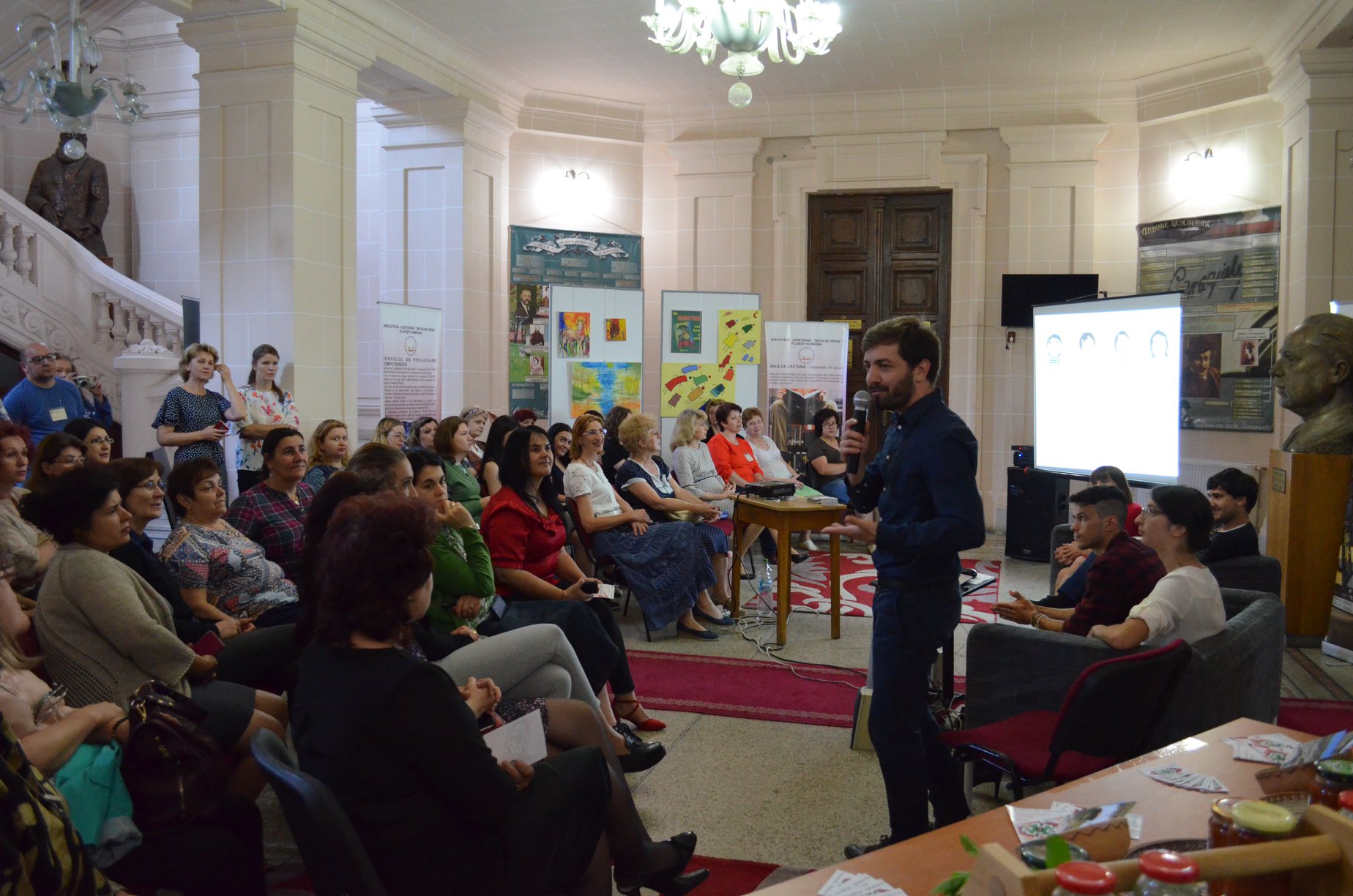
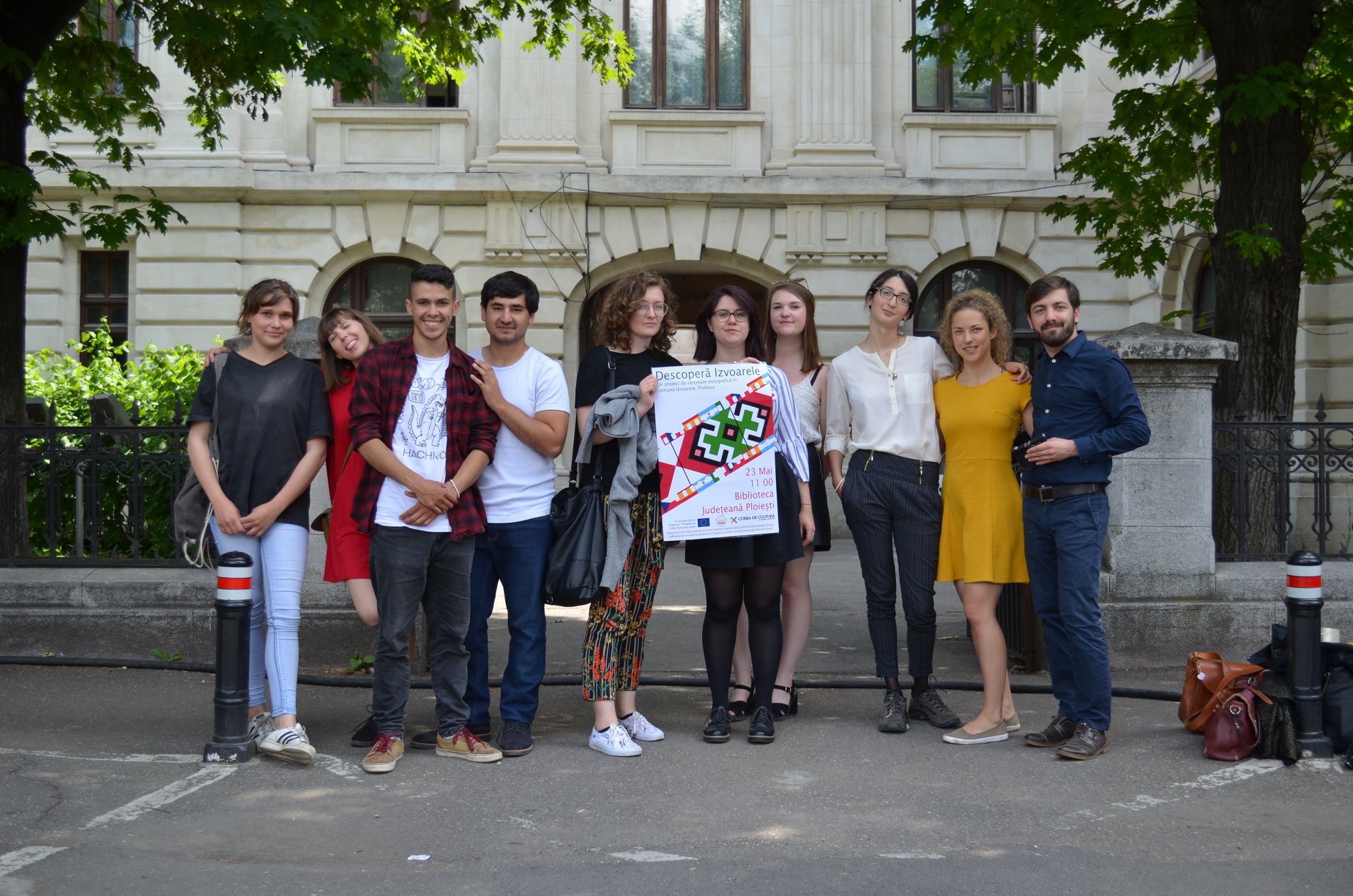
Resurse pe Izvoarele Unveiled (Descoperă Izvoarele):
Film documentar: https://tinyurl.com/y94ygdnp
Website: http://discoverizvoarele.ro/
Monografie: https://tinyurl.com/yapor72s
Playing, dancing, moving – Joc, dans, mișcare
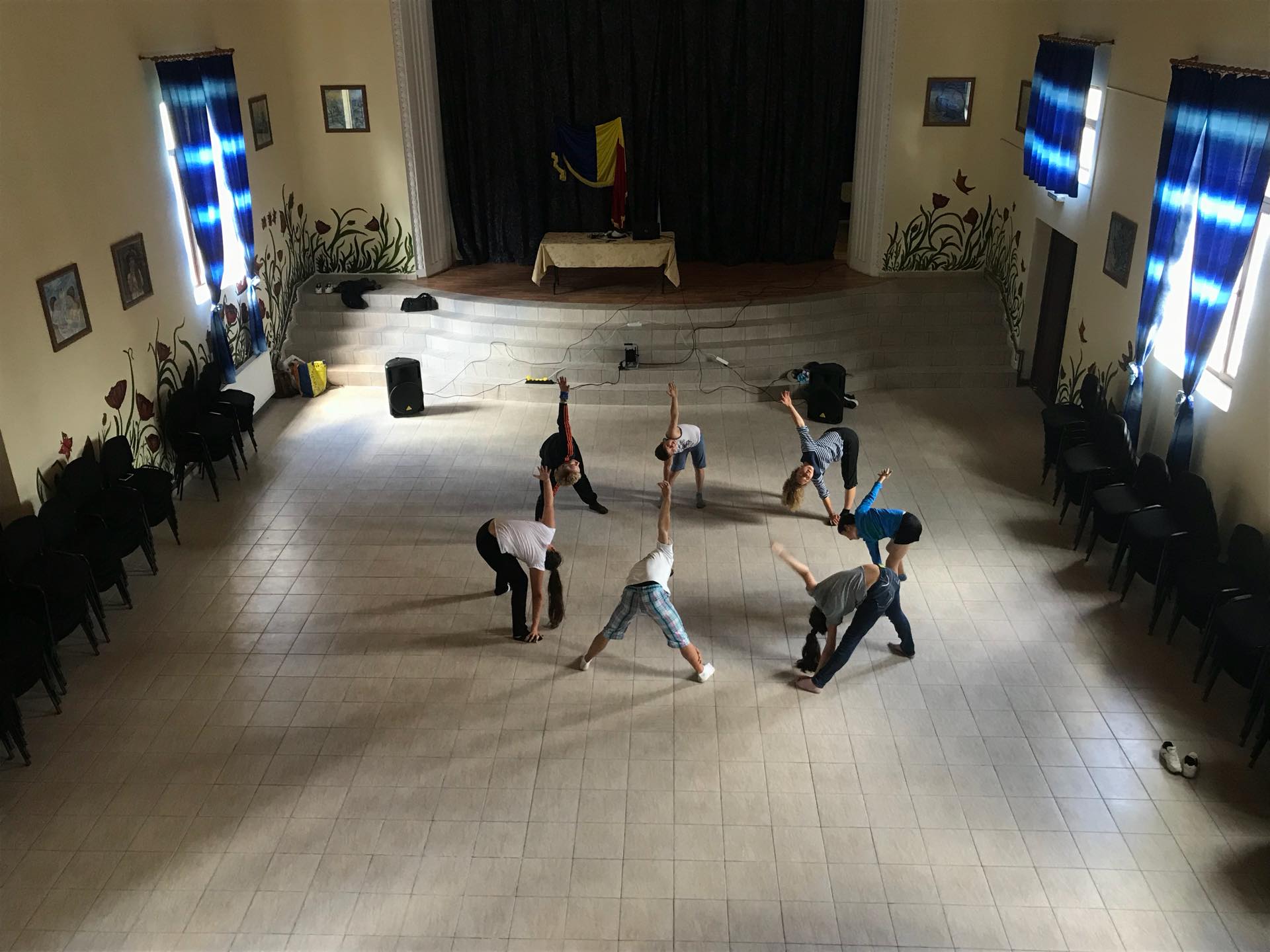 – Bună!!!
– Bună!!!
– Ada look this!
– Hello!
– So we start choreography now?
They come in. But not as you would expect, simply walking through the door. They’re already jumping, practicing turns, half way through taking their shoes off. I spot back bends in the corner and some breakdance moves on the floor. The energy is instant and I get a bit lost between exchanging hugs (landing near my belly button or chest depending on the age), preventing a sudden pinching fight, and trying to set up the speakers. Bear in mind that after two months my Romanian is just slightly more advanced than the basic ‘Buna’ and ‘Sunt
voluntar, nu înțeleg’.
Yet somehow I communicate with my small bunch of movers. We madly gesticulate, they pick up some English (or they say so and then do something complete opposite to what I said), or sometimes I have to pick them up and bring to the correct place. So here we are. The cold tiles of the immersive auditorium, semidarkness of the half-covered long windows, black chairs, tiny wooden stage, the Romanian flag on the curtains… And us – a small group gathered amongst all this with a rather extreme variety of sizes, ages, and experience in any kind of physical training. I look at my bunch, realising that I can forget about
everything that I planned for this lesson. I decide to improvise the exercises, focusing on one thing we all have in common – the desire to move. Eager to start straightaway, they throw themselves around, pushing the chairs to the side to make space, changing, snacking and drinking water.
– Ceeeeeeeeeerc!
Finally we all gather in a circle. From the speakers you can hear booming beats of African drums and the bodies start to groove in all kinds of different ways. I go with simple warm up exercises in a circle and then travelling through space. Inspired by some African influences, I teach them simple steps and arm gestures. I allow the chaos to unfold as they try to figure out the movement, only sometimes I bring the order back, explaining again or correcting.
– It’s like showing someone to go away.
I demonstrate the movement.
– Go away, go away, go away, go away, go..
And before you know it, the high pitched chorus of ‘Go away’ echoes through the space. I’m amazed by the power of those little lungs and decide to go with it.
– Așa, așa, așa, așa…
– Close, open, close, jump! Close, open, close, jump! Close, open, close, jump!
I’m breathless. We dance, we shout the steps, the right and left gets confused, as do the hands and legs. Their attention travels with the speed of lightning. Some boss around, some get tired, some go back to their pinching fight. Hands on my hips and pulling an angry face I catch one of the boys on talking, and we all crack up as he gets scared. Finally I shout ‘Pausa!! Apa!’ and let the chaos unfold. Legs are flying around in cartwheels, some lay on the chairs, there’s a bag of chips going around, and a hide and seek game unfolds behind the curtains accompanied by slightly concerning sound effects.
The magic word ‘Capoeira’ is what brings them back eventually. I demonstrate some basic steps, kicking and ducking and their eyes look like I’ve just brought kilograms of ice cream into the room. There is barely any patience to repeat the basics, and the legs start to kick in all kinds of directions.
– Right, back, left, back! Protect! Kick! Right back..
The sounds of birimbau, arms moving more in a disco way than anything else, and steps that look all too similar to salsa. But it all doesn’t matter. We exchange really cool handshakes at the end and I feel a buzzing sense of happiness that I can share these moments with my small bunch of movers.
– Bună!!!
– Ada uite aici!
– Bună!
– Putem începe coregrafia acum?
Au venit. Dar nu cum te-ai aștepta, intrând pe ușă pur și simplu. Deja sar, fac rotiri și se descalță în același timp. Am văzut niște îndoiri pe spate într-un colț și niște mișcări de breakdance pe podea. Energia e instantă și eu mă pierd puțin printre îmbrățișări (care îmi ajung la buric ori la piept, depinde de vârstă), prevenirea unor pișcături și încercarea de a instala boxele. Luați în considerare că după două luni româna mea e doar ceva mai avansată decât „Bună” și „Sunt voluntar, nu înțeleg.” Cumva totuși comunic că micii mișcători. gesticulăm cu toții, ei înțeleg un pic de engleză (sau pretind și apoi fac total opus), ori câteodată trebuie să îi aranjez eu în poziția corectă.
Prin urmare aici suntem. Dalele reci ale sălii, semiîntunericul dat de ferestrele lungi acoperite, scaunele negre, scena mică de lemn, steagul României agățat de cortina scenei… și noi – un grup mic adunat printre toate acestea, având mărimi, vârste și experiențe în ale mișcării diferite. Mă uit la grup și realizez că pot să uit ce planificasem. Decid să improvizez exerciții și să mă oncentrez pe un singur lucru – dorința de mișcare. Dornici să înceapă numaidecât, sar prinprejur, împing scaunele la o parte, se schimbă, mai mănâncă câte ceva și beau apă.
– Ceeeeeeeeeerc!
Cumva ne adunăm într-un cerc. Din boxe se aud beaturi de tobe africane și trupurile încep să se miște în feluri diferite. Încep cu exerciții de încălzire simple și de explorare a spațiului. Inspirați de influențele africane îi învăț pași simpli și gesturi ale brațelor. Permit haosului să se desfășoare ca ei să prindă mișcare. Câteodată restabilesc ordinea explicând și corectând.
– E ca și cum ai alunga pe cineva.
Demonstrez mișcarea
– Pleacă, pleacă, pleacă, ple…
Și înainte să realizăm refrenul „Pleacă” se aude în toată sala. Sunt uimită de puterea acestor mici plămâni dar continui. And before you know it, the high pitched
– Așa, așa, așa, așa…
– Închide, deschide, închide, sari! Închide, deschide, închide, sari!
Sunt fără suflare. Dansăm, strigăm pașii, încurcăm stânga cu dreapta și mâinile cu picioarele. Atenția lor călătorește cu viteza luminii. Unii se dau în stambă, alții sunt obosiți, unii se întorc al pișcături. Pun mâinile în șold și cu o față supărată îl suprind pe unul dintre băieți, care se sperie și cu toții ne prăpădim de râs. În cele din urmă strig „Pauză!” „Apă!” și las tot haosul să se desfășoare din nou. Unii fac roata țiganului, alții se așează pe scaune, o pungă de chipsuri trece de la unul la altul, un joc de v-ați-ascunselea ia loc printre draperii acompaniat de sunete îngrijorate.
Cuvântul magic „Capoeira” e cel care îi aduce din nou împreună. Le arăt niște pași de bază, lovituri și aplecări și ochii lor se măresc de parcă am adus câteva kilograme de înghețată în încăpere. Aproape că nu au răbdare să repete pașii de bază și picioarele încep lovituri în toate direcțiile.
– Dreapta, spate, stânga, spate! Lovește, dreapta, spate…
E gălăgie multă, mâinile se mișcă mai mult ca la discotecă iar picioarele par să danseze salsa. Dar nu prea contează. Ne strângem mâinile la final și am un sentiment de fericire știind că am un mic grup de mișcători cu care pot împărtăși astfel de momente.
Adrianna este în România pentru o perioadă de șase luni, din martie 2018 până în august 2018, în cadrul proiectului Active Youth in Rural Settings [2017-1-PL01-KA105-035693] proiect co-finanțat de Uniunea Europeană prin Programul Erasmus+ și implementat în România de către Curba de Cultură.
Portret de voluntar – Raimo (Estonia)
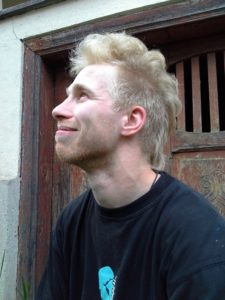 Po taught me „each one teach one “. Everyone on earth has something to show you that you never seen, something to tell you that you never heard, something to teach you that you never learned. So yes, this is me kind of …. My name is Raimo, I am 24 years old and come from a small place in middle Estonia called Võhma. There is not much that I know about myself, but the things I know are that I love adventure drawing , dancing, also I like to play any game any time to kill a bit time and I am always up for a challenge. If somebody would describe me I think main words would be goofy, weird and really clumsy.
Po taught me „each one teach one “. Everyone on earth has something to show you that you never seen, something to tell you that you never heard, something to teach you that you never learned. So yes, this is me kind of …. My name is Raimo, I am 24 years old and come from a small place in middle Estonia called Võhma. There is not much that I know about myself, but the things I know are that I love adventure drawing , dancing, also I like to play any game any time to kill a bit time and I am always up for a challenge. If somebody would describe me I think main words would be goofy, weird and really clumsy.
From my education officially I am builder or something to do with a construction not quite sure [honestly I forgotten the most that I learned already]. About 4 years ago I discovered breakdancing and ever since I had on and off relation with it. In this project I hope to spread a bit knowledge about ecological and sustainable lifestyle {permaculture] and if possible teach some breakdancing.
Am fost învățat că fiecare om poate învăța un alt om. Fiecare pe acest pământ poate să îți arate ceva ce nu ai mai văzut, ori să îți spună ceva ce nu ai mai auzit, ori să te învețe ceva ce nu ai știut. Cam ăsta sunt eu… numele meu e Raimo, am 24 de ani și vin dintr-un loc mic din mijlocul Estoniei, numit Võhma. Nu știu prea multe despre mine, dar ce știu e că iubesc să desenez, să dansez și să joc orice joc ce îmi omoară timpul, dar mai ales sunt deschis la orice provocare. Dacă cineva m-ar descrie, cred că principalele caracteristici ar fi haios, ciudat și împiedicat.
Conform educației mele sunt un constructor sau ceva legat de asta, nu sunt chiar sigur [sincer să fiu, am uitat mare parte din ce am învățat]. Acu 4 ani am descoperit breakdancing-ul și de atunci suntem înr-o relație. În acest proiect sper să pot împărtăși cunoștințe despre mediu și un stil de viață sustenabil, și dacă e posibil să îi învăț pe alții breakdancing.
Raimo este în România pentru o perioadă de șapte luni, din mai 2018 până în noiembrie 2018, în cadrul proiectului Building Youth supportive Communities – Environment [2017-2-RO01-KA105-037748] proiect co-finanțat de Uniunea Europeană prin Programul Erasmus+ și implementat în România de către Curba de Cultură.
Portret de voluntar – Tim (Portugalia)
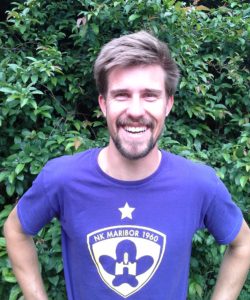 Boas! I’m 24 years old, I’m from the lovely Portuguese coastal city of Aveiro, and my name is Tim. You may think that this is not a very Portuguese name, and well, you’re right: my parents immigrated from Germany almost 30 years ago. Besides some travelling and a year of Erasmus exchange in Slovenia, I spent all my life in Portugal. There, I studied chemical engineering, finishing my master degree last year and working (very briefly) as a production engineer.
Boas! I’m 24 years old, I’m from the lovely Portuguese coastal city of Aveiro, and my name is Tim. You may think that this is not a very Portuguese name, and well, you’re right: my parents immigrated from Germany almost 30 years ago. Besides some travelling and a year of Erasmus exchange in Slovenia, I spent all my life in Portugal. There, I studied chemical engineering, finishing my master degree last year and working (very briefly) as a production engineer.
But something was missing.
I felt the weight of not having a concrete aim after leaving the university, and I was unable to build up enough motivation to work in a factory, producing some random goods that neither make people happier nor turn the world into a better place.
So, when the opportunity arose to be part of an environmental education project at Curba de Cultură, it didn’t take me long to pack my stuff and move further east than I’ve ever been before.
Besides some reforestation journeys back home, I have never really volunteered, and the only work with children I have done so far were some gymnastics lessons. So yes, I’m pretty much out of my comfort zone. And that’s great. It means that there is a lot for me to learn.
I love sports of almost any kind, and I already had the chance to practice a bunch of them, my latest passion being tennis. I’m also fond of everything that involves nature and being outdoor, such as hiking, cycling and gardening.
Sal’tare! Am 24 de ani, vin din adorabilul oraș Aveiro de pe coasta Portugaliei și mă numesc Tim. Probabil credeți că ăsta nu e un nume foarte portughez, ei bine, aveți dreptate: părinții mei au emigrat din Germania cu 30 de ani în urmă. Înafară de câteva călătorii și un an de studii Erasmus în Slovenia, mi-am petrecut restul vieții în Portugalia. Acolo am studiat Chimie Industrială, am terminat masteratul anul trecut și am lucrat (puțin) ca inginer de producție.
Dar ceva lipsea.
Am simțit apăsarea faptului că nu aveam un scop precis după terminarea facultății și nu eram capabil să mă motivez suficient cât să lucrez într-o fabrică, făcând niște obiecte care nu fac oamenii fericiți și nici nu fac lumea mai bună.
Prin urmare când a apărut ocazia de a deveni parte a unui proiect de educație pentru mediu la Curba de Cultură, nu mi-a luat mult să îmi împachetez lucrurile și să mă mut mai la est decât am fost vreodată.
Înafară de câteva acțiuni de împădurire, nu am făcut voluntariat, și singura muncă pe care am făcut-o cu copii au fost orele de gimnastică. Da, sunt înafara zonei mele de confort și asta e minunat. Și mai înseamnă că există multe pe care pot să le învăț.
Iubesc sporturile de orice fel și am avut șansa să practic câteva dintre ele, dar cea mai recentă pasiune a mea este tenisul. De asemenea orice implică natura și statul afară mă încântă, precum drumețiile, ciclismul și grădinăritul.
Tim este în România pentru o perioadă de șapte luni, din mai 2018 până în noiembrie 2018, în cadrul proiectului Building Youth supportive Communities – Environment [2017-2-RO01-KA105-037748] proiect co-finanțat de Uniunea Europeană prin Programul Erasmus+ și implementat în România de către Curba de Cultură.
2 Days in Timișoara – 2 zile în Timișoara
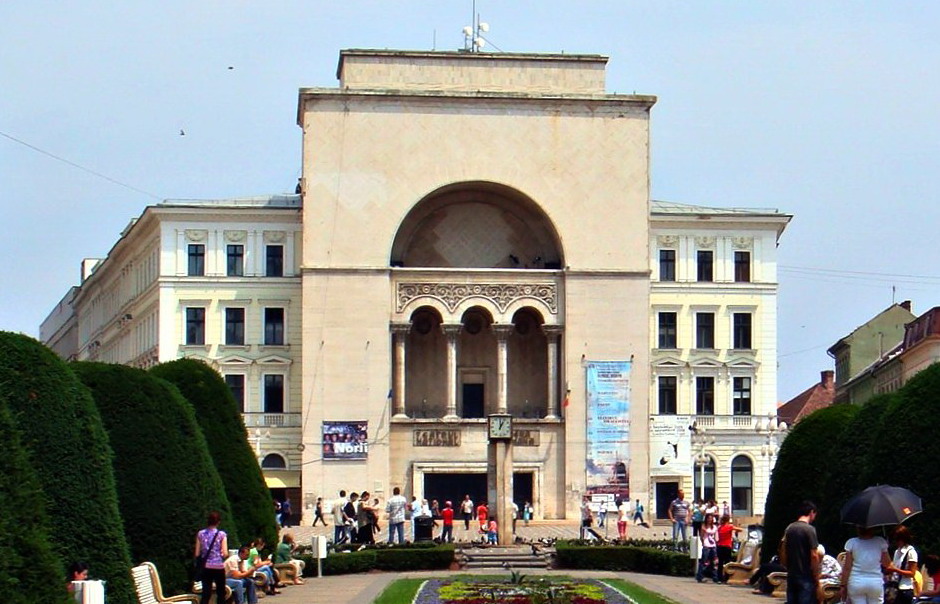 Warm, sunny weather and tempting, stunning Romania- it all gave me an opportunity to take some adventure and discover some unknown for me areas of this amazing country. I decided to go to Timișoara!
Warm, sunny weather and tempting, stunning Romania- it all gave me an opportunity to take some adventure and discover some unknown for me areas of this amazing country. I decided to go to Timișoara!
Timișoara is one of the biggest cities in western part of Romania and the main social, economic and culture centre there. Before my trip I didn’t know much about the city, but everyone said it’s one of this places you should visit if you stay in Romania for a longer period of time, because of its importance, beautiful architecture and great… “vibes”. The only problem was, how to get there! Timișoara is (unfortunately) located on the other side of the country than my home during EVS (Homorâciu village). Because I took this decision of going there quite spontaneously, it was too late to book some cheap flight tickets. That’s why I decided to go by train.
The whole trip was quite exhaustive. I had to get to Bucharest first, wait about 4 hours for a train and then my train finally arrived. It took me about 11 hours to put my feet on the ground. Luckily, I traveled by night, so I could sleep a little. I was surprised how safe I felt traveling alone through the whole country. I wasn’t afraid of being robbed, I have deep dose of trust and faith in people. I find Romanians friendly and helpful so it is easier to feel comfortable here. Also Romanian trains look exactly same as in Poland, which gives me a feeling of security.
I spend two days in Timișoara, where I met with an old friend of mine from Poland. It was an amazing experience to see someone for the first time since very long time and to do that in Romania. We spend joyful time there, visiting Orthodox churches, which are very interesting and for me. I am attracted to different cultures and this architecture style I find very appealing. We enjoyed our time in local pubs and restaurant, which Timișoara is full of. I saw the most famous and beautiful areas there. In this city there are many cultural events and festivals so it was quite a pity, that I had so little time and couldn’t participate. But the whole weekend was super cool anyway.
Unfortunately, as people say, all good things always must to come an end. The same was with my Timișoara adventure. After two amazing days in the city I had to say goodbye to this place. The long way back was waiting for me. I went by a train again and came back to Homorâciu .
For me it was my first long journey, here in Romania. I’m happy I could spend some time in such attractive, enjoyable city. I hope I will return there one day, but I’m looking forward to see other important places in this country too!
Vremea caldă, însorită și o Românie tentantă și uimitoare – mi-a dat șansa de a lua parte într-o aventură și de a-i descoperi părți mai puțin cunoascute. Așa am decis să merg în Timișoara.
Timișoara e unul dintre cele mai mari orașe din vestul Românieiși centru social, cultural și economic. Înainte de a călători acolo nu cunoșteam orașul, dar toți ziceua că e un loc de vizitat dacă stai în România ceva mai mult timp, datorită importanței, arhitecturii frumoase și datorită energiilor pozitive. Singura problemă era să ajung acolo. Timișoara e din păcate localizată în cealaltă parte a țării decât casa mea din timpul SEV-ului (satul Homorâciu). Pentru că am decis destul de spontan că voi merge acolo a fost cam târziu să iau avionul. Așa se face că am mers cu trenul.
Călătoria a fost destul de obositoare. Am mers întâi la București, am așteptat 4 ore un tren și în cele in urmă a sosit. Mi-a luat 11 ore să ajung. Din fereicire am călătorit pe durata nopții, așa că am dormit puțin. Am fost surprinsă cât de în siguranță m-am simțit călătorind singură prin țară. Nu mi-a fost teamă de a fi jefuită, am o doză mare de încredere în oameni. Românii sunt destul de prietenoși și săritori, deci e simplu să te simți confortabil. În plus trenurile românești arată ca cele din Polonia, ceea ce mi-a dat un sentiment de siguranță.
Am petrecut 2 zile în Timișoara unde m-am întâlnit cu un prieten din Polonia. A fost minunat să văd pe cineva după o lungă perioadă de timp și mai ales în România. Am petrecut un timp minunat, am văzut biserici ortodoxe, care sunt foarte interesante pentru mine. Sunt atrasă de diferite culturi și găsesc acest stil arhitectual foarte captivant. Ne-am simțit bine în localuri și restaurante, de care sunt din belșug în Timișoara. Am văzut cele mai faimoase și frumoase zone de acolo. În oraș sunt numeroase evenimente culturale și festivaluri și mi-a părut rău că din cauza timpului scurt nu am putut participa la ele. Întregul sfârșit de săptămână a fost minunat.
Din păcate lucruril bune nu țin mult. La fel a fost și cu aventura mea în Timișoara. După două zile minunate în oraș a trebuit să zic la revedere acestui loc minunat. o călătorie lungă de întors mă aștepta. Și din nou cu trenul până la Homorâciu.
Asta a fost prima mea călătorie lungă aici în România. Și am petrecut timp minunat într-un oraș atractiv și agreabil. Sper să mă întorc într-o altă zi, dar abia aștept să văd și alte locuri din țara asta!
Anna este în România pentru o perioadă de șase luni, din martie 2018 până în august 2018, în cadrul proiectului Active Youth in Rural Settings [2017-1-PL01-KA105-035693] proiect co-finanțat de Uniunea Europeană prin Programul Erasmus+ și implementat în România de către Curba de Cultură.
Ten minutes in Illusion – Zece minute în Illusion
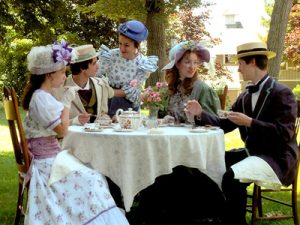 Once upon a time, five of the nine EVS-Curba de Cultură-Volunteers decided to take a trip to Oraș Valenii and discover it’s wild night life. So we packed our belongings and jumped in the red limousine. As we arrived there, we enjoyed our time in the vehicle, had some serious discussions about our investment collapses, drank apple juice and listened to classical music. We were in the parking space of the famous and well-known “Illusion”, a place where you can discuss politics, business and family life. After having finished our drinks and listened to the Sonata of Beethoven – of course the 5th, not the 9th, because it’s too wild – we decided that it was the proper timing to enter this wonderful place.
Once upon a time, five of the nine EVS-Curba de Cultură-Volunteers decided to take a trip to Oraș Valenii and discover it’s wild night life. So we packed our belongings and jumped in the red limousine. As we arrived there, we enjoyed our time in the vehicle, had some serious discussions about our investment collapses, drank apple juice and listened to classical music. We were in the parking space of the famous and well-known “Illusion”, a place where you can discuss politics, business and family life. After having finished our drinks and listened to the Sonata of Beethoven – of course the 5th, not the 9th, because it’s too wild – we decided that it was the proper timing to enter this wonderful place.
This place was exactly what we were looking for, so we made our way to one of the sitting couches. Besides this, we went to the bar to order peppermint tea with a pinch of honey but we also tried the black tea with cream, which was fabulous. After we finished our drinks, we decided to have a little bit of “fun”. We arranged ourselves in a pentagon and started, accompanied by the finest tunes of classical music, waltzing through the space. It was a marvelous but exhausting experience so we took a revivifying breath of fresh air. After this, we went inside to join our other company but then we noticed that one person was missing. A little bit confused and shocked we turned to the security, as we were afraid something had happened to our compañero. One of us was extremely under pressure, so he raised his voice and called the security: “You damned and luxurious mountain goat!” The security guard was not amused, so he roared in his deep voice: “Depart at once, all of you!”
Outside, we decided not to let our good humors to be tamed and went to the horse auction to rate our feelings on a scale from 1 to 10. After this, we were completely famished and went for a little gourmet trip to an oriental palace. When we arrived there, we took “tavuk sis”, a traditional Turkish dish, as nourishment full of rich vegetables, spices and gold. After this wonderful meal, we went back to our automobile and spent some more time there. “Growing up in Belgium, half Polish half German”-Melanie felt a little bit seasick, so she proceeded to regurgitate. “Kind hearted young savior of Octopus Peña Sweetiepie”-Gabriel Marimon decided to go for a night walk to the fountain and thus, came back with 5 liters of water. “Rock’n’Roll”-Roman took a beauty sleep to relax from quarreling with the security. My lovely “but sharing your room with unknown people is a little bit different”-roommate Martina just wondered, how she encountered such extravagant people. I went back to Illusion, to find something to light a scented candle. After this eventful night, we went back home to quiet and peaceful Sat Homorâciu and lived happily ever after.
Odată, nu foarte demult, cinci dintre cei nouă voluntari SEV găzduiți de Curba de Cultură au decis să călătorească spre orașul Vălenii de Munte și să îi descopere viața de noapte. Așadar ne-am împachetat câte ceva și am sărit în limuzina roșie. Când am ajuns, am mai petrecut puțin timp în vehicul, am discutat destul de serios despre investițiile la bursă, am savurat un suc de mere și am ascultat muzică clasică. Eram în parcarea faimosului și binecunoscutului “Illusion”, un loc unde poți discuta politică, afaceri și viață de familie. După ce ne-am terminat băuturile și am ascultat o sonată de Beethoven – desigur că a 5-a, e 9-a e mult prea sălbatică – am decis că e vremea să intrăm în acest loc minunat.
Localul era exact ceea ce căutam, prin urmare ne-am îndreptat spre canapele. După ce ne-am luat de la bar ceai de mentă cu un strop de miere și am încercat și ceaiul negru cu frișcă, care a fost fabulos. După ce ne-am terminat băuturile am decis să ne distrăm puțin. Ne-am aranjat în formă de pentagon și am început acompaniați fiind de cele mai fine acorduri muzicale, valsând prin încăpere. A fost o experiență uimitoare dar și foarte obositoare și a fost nevoie să ieșim la aer. Odată reîntorși înauntru am observat că unul dintre noi lipsea. Puțin confuzi și șocați ne-am adresat pazei localului deoarece ne temeam că s-a întâmplat ceva companionului nostru. Datorită presiunii evenimentului, unul dintre noi a cedat și a ridicat vocea la pază: ”Capră de munte blestemată!” Paza nu a fost încântată și a mugit într-o voce joasă: „Dispăreți de aici, cu toții!”
Odată afară am decis să nu lăsăm să ne fie stricată bună dispoziție și am mers la o licitație de cai ca să ne mai binedispunem. După toate astea foamea și-a spus cuvântul și ne-am îndreptat spre un local oriental. Acolo am servit „tavuk sis”, un fel tradițional turk foarte hrănitor datorită amestecului de legume, condimente și aur. După această masă minunată ne-am reîntors la automobil și am mai petrecut ceva timp. Melanie „cea crescută în Belgia dar jumate poloneză-jumate nemțoaică” s-a simțit puțin rău și a fost nevoită să regurgiteze. „Blândul tânăr salvator al lui Octopus Peña Sweetiepie” – Gabriel a decis să facă o plimbare nocturnă la fântână și s-a întors cu cinci litri de apă. „Rock’n’Roll” – Roman și-a făcut somnul de frumusețe pentru a se relaxa după interacțiunea cu forțele de ordine. Draga mea „să împart camera cu cineva necunoscut e puțin ciudat” Martina a început să se întrebe cum se face că îți petrece timpul cu oameni așa extravaganți. Eu m-am întors la Illusion să găsesc ceva de aprins o lumânare parfumată. După această noapte plină de evenimente ne-am întors acasă în satul nostru liniștit, Homorâciu, și am trăit fericiți până la adânci bătrâneți.
Note: această poveste scrisă de Stefanie este un pamflet bazat pe viața de voluntar SEV într-o zonă rurală și trebuie tratată ca atare.
Stefanie se află în România pentru o perioadă de 9 luni, din septembrie 2017 până în mai 2018 în cadrul proiectului Volunteer for Rural Communities (ref nr 2017-2-LI02-KA105-000049), proiect co-finanțat de Uniunea Europeană prin Programul Erasmus+ și implementat în România de Asociația Curba de Cultură.
Portret de voluntar – Anna (Polonia)
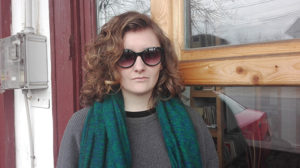 My name is Anna, I’m 28 years old and I come from Poland. For long time after I graduated from University ( pedagogy, social rehabilitation) I have worked with youth and children from dysfunctional families. I have also been a volunteer and coordinator in many projects in polish drug rehabilitation centres, which was a great practice for me. After years living in Poland I was tired and bored of the reality, so I decided to do something different. And that is how I ended up in EVS in Romania. I didn’t know much about this country, but I was very hungry for knowledge and new experiences. My first associations with Romania? Dracula (!), Transylvania and…Cristian Mungiu. The more I started to read about this country, the more I realized how fascinating this place is and how rich is a culture and the nature of Romania. I hope I will explore as much as it is possible. I also hope to improve my English, learn a little bit of Romanian and least, but not last to gain new professional experience, working with teenagers from different nationality than my own.
My name is Anna, I’m 28 years old and I come from Poland. For long time after I graduated from University ( pedagogy, social rehabilitation) I have worked with youth and children from dysfunctional families. I have also been a volunteer and coordinator in many projects in polish drug rehabilitation centres, which was a great practice for me. After years living in Poland I was tired and bored of the reality, so I decided to do something different. And that is how I ended up in EVS in Romania. I didn’t know much about this country, but I was very hungry for knowledge and new experiences. My first associations with Romania? Dracula (!), Transylvania and…Cristian Mungiu. The more I started to read about this country, the more I realized how fascinating this place is and how rich is a culture and the nature of Romania. I hope I will explore as much as it is possible. I also hope to improve my English, learn a little bit of Romanian and least, but not last to gain new professional experience, working with teenagers from different nationality than my own.
Privately I am very open-minded person, I love to meet new people, travel and discover beauty in every, even not so obvious places. I also love to read books, going to the cinema and especially to the theatre, which is my new passion. I would like to see some plays here also. I will do everything I can to spend an inspiring and productive time here. And come back with thousand of great memories and photos.
Numele meu este Anna, am 28 de ani și vin din Polonia. Pentru o bună bucată de vreme, după ce am terminat facultatea (pedagogie, reabilitare socială) am lucrat cu tineri și copii care proveneau din familii disfuncționale. Am fost voluntar și coordonator în proiecte desfășurate de centre de reabilitare poloneze, lucru care a constituit o bună practică. După atâția ani de trăit în Polonia am obosit și m-am plictisit de cotidian, prin urmare am decis să fac ceva diferit. Și așa am ajuns în acest SEV în România. Nu știam prea multe despre țara asta, dar sunt dornică de noi cunopștințe și experiențe. Ce îmi vine în minte legat de România? Dracula (!) Transilvania și… Cristian Mungiu. Cu cât citesc mai mult despre țara asta, cu atât mai mult descopăr căt de fascinant e acest loc și ce cultură și natură bigată are România. Sper să pot explora cât mai mult. De asemenea sper să îmi îmbunătățesc engleza, să învăț ceva română și nu în ultimul rând să acumulez experiență profesională muncind cu tineri de o altă naționalitate decât a mea.
Înafară de asta sunt o persoană deschisă, îmi place să întâlnesc noi oameni, să călătoresc și să descopăr frumusețe orice locuri, chiar și în cele mai puțin evidente. De asemenea iubesc să citesc, să merg la film și teatru, astea sunt pasiunile mele. Mi-ar place să văd niște piese și aici. Voi face tot posibilul sp am parte de un timp productiv și inspirațional. Și să mă întorc cu mii de amintiri și fotografii.
Anna este în România pentru o perioadă de șase luni, din martie 2018 până în august 2018, în cadrul proiectului Active Youth in Rural Settings [2017-1-PL01-KA105-035693] proiect co-finanțat de Uniunea Europeană prin Programul Erasmus+ și implementat în România de către Curba de Cultură.
Portret de Voluntar – Adrianna (Polonia)
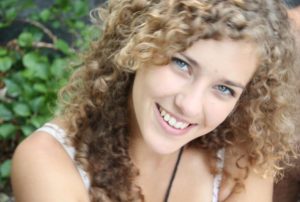 Salut! I’m Adrianna and I’m 24 years old. I come from Poland but for the past 6 years I’ve been living in all kinds of different parts of the world. Throughout my nomad life I went to American High School, studied in the UK, did courses and internships in Vienna, Singapore, London, and Edinburgh, and most recently spent 3 months volunteering in Ghana. So of course I love travelling, learning about different cultures and ways of living, and getting to know people. But my main interest is in dance – I have a Bachelor’s degree in Dance and Culture and I’ve explored many different forms of movement – contemporary dance, contact improvisation, African contemporary, Kathak (traditional Indian dance), yoga, and others. I’m passionate about exploring how movement reflects on the culture, dancing with people, and being creative whilst moving. I have other passions too – reading books, going on nature trails, trying new food (!), listening to good music, and engaging in all kinds of story telling and discussions,
Salut! I’m Adrianna and I’m 24 years old. I come from Poland but for the past 6 years I’ve been living in all kinds of different parts of the world. Throughout my nomad life I went to American High School, studied in the UK, did courses and internships in Vienna, Singapore, London, and Edinburgh, and most recently spent 3 months volunteering in Ghana. So of course I love travelling, learning about different cultures and ways of living, and getting to know people. But my main interest is in dance – I have a Bachelor’s degree in Dance and Culture and I’ve explored many different forms of movement – contemporary dance, contact improvisation, African contemporary, Kathak (traditional Indian dance), yoga, and others. I’m passionate about exploring how movement reflects on the culture, dancing with people, and being creative whilst moving. I have other passions too – reading books, going on nature trails, trying new food (!), listening to good music, and engaging in all kinds of story telling and discussions,
Saying that, my experience is a wild mix of different adventures – I have worked as assistant producer, choreographed my own pieces, co-directed a student dance company, danced with mixed-ability youth, and co-led scout troupe in Poland and teams of volunteers in Singapore and Ghana.
Now EVS in Curba de Cultura is my next adventure. I’m looking forward to learning about the Romanian culture, getting to know people, and exploring the beauty of this country (I’ve done some hikes already so I know that it is very beautiful here!). I’ll be looking out for opportunities to share and exchange ideas, movements and be creative together.
Salut! Eu sunt Adrianna, am 24 de ani și sunt din Polonia, dar în ultimii 6 ani am locuit în diferite părți ale lumii. În viața asta nomadă a mea am fost la liceu în America, am studiat în Regatul Unit, am urmat diferite cursuri în Viena, Singapore, Londra și Edinburgh, iar recent am făcut 3 luni de voluntariat in Ghana. Prin urmare iubesc să călătoresc, să învăț despre alte culturi și alte moduri de viață și să cunoasc oameni. Dar principalul meu interes este dansul – am o licență în Dans și Cultură și am explorat diferite tipuri de mișcare, de la dans contemporan, improvization contact, dans african contemporan, Kathak (dans tradițional indian), yoga și multe altele. Îmi place să explorez modul în care mișcarea reflectă cultura, modul în care oamenii dansează și cum să fii creativ în timp ce te miști. De asemenea sunt pasionată de lectură, plimbări în natură, să încerc noi feluri de mâncare, să ascult muzică bună și să mă implic în discuții și povești.
Prin urmare experiența mea este un amestec de aventuri – am lucrat ca asistent producător, mi-am coregrafiat propriile piese, am co-regizat un grup de dans studențesc, am dansat cu tineri cu diferite abilități și am condus un grup de cercetași în Polonia și o echipă de voluntari în Singapore și Ghana.
Acum un stagiu SEV la Curba de Cultură este noua mea aventură. Sunt curioasă să aflu mai multe despre cultura românească, să cunosc oameni și să explorez această țară frumoasă (am făcut deja scurte drumeții și știu că e frumos aici). De asemenea voi profita de șansele care apar pentru a împărtăși și schimba idei de mișcare și pentru a fi creativi împreună.
Adrianna este în România pentru o perioadă de șase luni, din martie 2018 până în august 2018, în cadrul proiectului Active Youth in Rural Settings [2017-1-PL01-KA105-035693] proiect co-finanțat de Uniunea Europeană prin Programul Erasmus+ și implementat în România de către Curba de Cultură.
Three years of hosting EVS volunteers
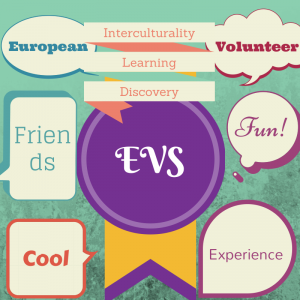 Curba de Cultură is hosting international volunteers for almost three years. We started in 2015 with one volunteer and in this moment there are 8 volunteers hosted simultaneously. From intercultural education done through nonformal methods in schools, outdoors, in the cultural centres and in the Youth Centre of Curba de Cultura to promoting volunteering through presentations and games and through videos showing EVS life, to gathering materials with regard to the specific of Izvoarele commune in order to promote it, to make it known and to show to people that rural Romania still has lots to offer.
Curba de Cultură is hosting international volunteers for almost three years. We started in 2015 with one volunteer and in this moment there are 8 volunteers hosted simultaneously. From intercultural education done through nonformal methods in schools, outdoors, in the cultural centres and in the Youth Centre of Curba de Cultura to promoting volunteering through presentations and games and through videos showing EVS life, to gathering materials with regard to the specific of Izvoarele commune in order to promote it, to make it known and to show to people that rural Romania still has lots to offer.
Below you can see collected, from some of the volunteers hosted, the thoughts they had in the end of their stay in Romania at Curba de Cultura.
Personal comments
For my personal and professional development, this EVS was the best decision I could take. I didn’t expect to have as many positive things in return and to feel as involved in the project. The main reason was to have a really serious and helpful hosting organization, with the coordinators and president who did all what I need to feel at home and comfortable with my new life. This experience was amazing! (Estelle, France – 9 months)
So I’m going out of this EVS with a lot of happiness, it teaches me a lot, to become someone better, to understand things better. (Mael, France – 5 months)
I am really glad to come here. I learnt a lot of new things, about culture, people, places, but also about myself. Thanks for those perfect 5 months! I will never forget it, and it changed a part of me, I am really proud of that, and it’s thanks to you. (Margot, France – 5 months)
I feel a better person. (Sophie, France – 12months)
I am proud to have done and European Voluntary Service and I changed a lot during 10 months. I found out what is my passion and what I want to do after EVS. (Liina, Estonia – 10months)
Truly I can say that I feel extremely strong person now and I hope that I will never lose this feeling. (Ania, Poland – 9 months)
Thanks to the EVS I got to know what I really would like to do in the future and I hope to make awesome cooperation with my hosting organization. (Eleny, Estonia – 5 months)
I feel different than 6 months ago, now I have a more clear idea about myself. I hope that every person that starts an EVS project has the fortune to meet an association with amazing people like my hosting organization. (Alessio, Italy – 6 months)
I would never expect so many new experiences, although some of them were harder than I would think in the beginning of my staying here. And I would definitely not expect people taking so awesome care about me and all of us, EVS volunteers. (Anna, Czech Republic – 6 months)
At first when I accepted to come on this project I was a little bit sad because it’s an village and you don’t have a lot of things to do here, but meeting others EVS volunteers and coordinators of the projects this changed, because they made this six months more interested. Talking with people from others city and listening to their problems with coordinators, housemates, project and mentor I was really happy that I was part of Curba de Cultura. (Martina, Croatia – 6 months)
Just thank you to whoever was the genius who invented EVS, and of course to Curba de Cultura – you are simply the best! (Melanie, Belgium – 6 months)
Would you recommend EVS to others? Why?
Yes, of course, I recommend it! Because whatever you do as an EVS, you will learn more than you expected and you will discover stuff which will change your state of mind. It permits to learn better about oneself and about the other. It’s very good experience to improve competences and to discover new ones. (Estelle, France – 9 months)
Yes, I would recommend other to do an EVS because it opens your mind, it makes you aware about things that you never be, never thought about. It can really change a life. New chances can appear. (Mael, France – 5 months)
I would recommend to everybody who can do it, to do an EVS. (Margot, France – 5 months)
Yes. It’s good to learn to live by yourself (Sophie, France – 12 months)
Definitely I would recommend EVS to other people. It is a great chance to do something for yourself, to become a better person and in the same time to help the local community in another country. (Liina, Estonia – 10 months)
EVS is a life changing experience which makes you richer. (Ania, Poland – 9 months)
I definitely recommend EVS: – new ways of seeing things around you, have a chance to think about your life, learn a lot about yourself, improve your skills, find friends for life. (Eleny, Estonia – 5 months)
Of course yes! EVS is something very great for personal growing and is an amazing life experience. (Alessio, Italy – 6 months)
EVS brings together people who would never meet and live together. It can be hard, it is hard, but is one of the biggest experiences and one of the biggest improvement people can reach in their life. (Anna, Czech Republic – 6 months)
I would recommend EVS to others people, because is the best way to learn about yourself, about your life and your future, what you like and what you don’t like. You also have opportunity to express yourself, give your ideas and together with others you implement your ideas, you can learn about different ways of work, different types of work witch’s going to help you in the future for your job. (Martina, Croatia – 6 months)
I would of course recommend anybody to do an EVS, simply because it can be an incredibly valuable experience that can have great impacts on your future in any sense and for me at least it was most definitely the best thing I did in my life. (Melanie, Belgium – 6 months)
A French Girl’s Guide to Bucharest – Ghidul unei franțuzoaice în București
 [Textul în limba română, mai jos]
[Textul în limba română, mai jos]
One of my favourite things when I visit a foreign country is when local people start talking to me like I’m one of them. It happens to me every time I’m in Bucharest: some old lady asks me in really fast Romanian if I know this or that street, and all I can answer is Nu ştiu! with a confused smile, but it still makes me happy because I feel like I belong.
But I also enjoy being a tourist. And even after a few months in Romania, I still feel like one sometimes. I’ve decided to just go with it and write a French Girl’s Guide to Bucharest.
TRANSPORTATION
From the airport to the city
You need to purchase this travel card at a counter downstairs. The lady there won’t speak English very well, but if you’re French it’s probably fine since French people all speak terrible English anyway. Just show the number of calatorii you need on your fingers and slip in your credit card. Get on the bus, wait half an hour and you’re in Bucharest.
Taking the Metro
Maybe you got off the bus at the wrong stop or your accommodation is a bit far from the center. Then you can just take the Metro. It’s a pretty regular subterranean network, so just get in. You can even choose to have the machine to buy the cards talk to you in French if you’re too lazy to try to figure it out in Romanian.
Taking the taxi
Ask for the fare before the guy drives off. If you’re French, you’re used to complaining a lot, so it shouldn’t be a problem for you to tell the driver that 80 lei for a ride that’s usually 30 is a bit much. If you’re not French and don’t know how to complain, just pay the guy whatever.
Walking
The center of Bucharest is not that big, so stop Ubering everywhere and walk around. And that’s coming from a person who hates walking.
VISITING
If you’ve been to Bucharest before, you’ve probably seen that passage with the umbrellas. If you have people visiting Bucharest with you who haven’t researched the city, it’s a good place to bring them so you can pretend that you really know all the cool hidden alleys and corners. You don’t need to tell them that it’s actually pretty famous. It makes good Instagram pictures, isn’t that enough?
Back to that French perspective on things, you come from a Catholic country. Religious or not, now is the time to enter one of the many Orthodox churches of Bucharest. You can’t miss them, and they make our cold grey buildings look very sad (sorry).
But seriously, if you’re only here for a few days, just go on one of the Walkabout free tours (yes, I am suggesting that you walk again). They’re awesome.
GOING OUT
I can see you, French person trying to find a cheap glass of wine. It doesn’t exist (unless you’re from Paris, in which case everything will look super cheap anyway because you live in the worst city on the planet). So might as well go for a cocktail, a local beer (some bars and restaurant have their own) or even some ţuica (will make you warmer if you’re visiting during the winter).
The old city doesn’t lack places to go out. It might actually be more difficult to find a place not to go out, there. If you’re on a budget (or cheap), walk around (!) that part of town to find that 5 lei bar. A little further from the old city are a few clubs that will make you feel like you’re in Berlin, but without the impossible dress codes and the scary bouncers. Some places will allow you to see a punk concert and dance to techno one week apart – que demande le peuple?*
COMMUNICATING
Just bring your French grandmother who speaks zero English and only remembers German from Christmas carols. For some reason, she will manage to get anything she needs while you struggle to make one sentence in Romanian.
Also, tip people, and if you go to a restaurant, be hungry (Romanian portion sizes > French portion sizes).
*(what more could you ask for?)
Unul dintre lucrurile mele favorite când vizitez o țară străină este când localnicii îmi vorbesc în limba lor ca și cum aș fi unul dintre ei. Mi se întâmplă asta de fiecare dată când merg în București: niște doamne în vârstă m-au întrebat într-o română rapidă dacă știu o anume stradă și tot ce am putut răspunde a fost NU știu! cu un zâmbet confuz, dar mă face fericită în continuare dându-mi sentimentul că aparțin locului.
Totodată îmi place și să fiu turist. Și chiar și după câteva luni în România, mă simt în continuare turist câteodată. Prin urmare am decis să scriu acest Ghid al unei Franțuzoaice în București.
TRANSPORT
De la aeroport la centru
Trebui să îți achiziționezi un card de călătorie de la parterul clădirii. Tanti de acolo nu va vorbi engleză prea bine, dar dacă ești francez e în regulă din moment ce francezii vorbesc groaznic engleză. Doar arată pe degete câte călătorii vrei și plătește cu cardul. Urcî-te în autobuz, așteaptă o jumătate de oră și ești în centru.
Metrou
Poate te-ai dat jos la stația greșită, ori ai cazarea mai departe de centru. Atunci poți lua metroul. E la fel ca orice alte rețele de metrou, așa că doar trebuie să te urci în el. Poți chiar alege ca automatul de bilete să fie în franceză dacă ție prea lene să încerci în română.
Taxi
Întreabă de prețul cursei înainte de a urca. Dacă ești francez ești deja obișnuit să te plângi, deci nu ar trebui să fie o problemă să îi spui șoferului că 80 de lei pentru o cursă de 30 e prea mult. Dacă nu ești francez și nu știi să te plângi, atunci plătește.
Plimbare
Centrul Bucureștiului nu e mare, deci nu mai folosi Uber peste tot și plimbă-te. Și acest sfat vine de la o persoană care urăște mersul pe jos.
VIZITE
Dacă ai mai fost în București probabil ai văzut pasajul cu umbrele. Dacă ai pe cineva care vizitează Bucureștiul cu tine, ăsta e un loc bun să îi aduci ca să te prefaci că știi alei și colțuri ascunse ale Bucureștiului. Nu trebuie să le spui că e un loc destul de faimos. Și e foarte bun pentru poze de Instagram, nu e destul?
Întorcându-ne la perspectiva franțuzească asupra lucrurilor, vii dintr-o țarp catolică. Fie că ești religios sau nu, acum e momentul să intri în una din multele biserici ortodoxe din București. Nu poți să le ratezi, mai ales că ele fac ca clădirile noastre gri să arate trist (îmi pare rău).
Serios acum, dacă ești în București doar pentru câteva zile, ia un tur gratuit (da, îți sugerez din nou să mergi pe jos). Sunt mișto.
IEȘIT ÎN ORAȘ
Ca francez deja îmi imaginez că vrei să găsești un pahar ieftin de vin. Nu există (decât dacă ești din Paris, caz în care totul va părea foarte ieftin pentru că oricum locuiești în cel mai prost oraș de pe planetă). Prin urmare poți să iei un cocktail, o bere locală (unele baruri și restaurante le au chiar pe ale lor) ori chiar niște țuică (care te va încălzi dacă vizitezi orașul pe perioada iernii).
Centrul vechi are numeroase localuri. De fapt cred că ar fi mai greu să nu găsești unul. Iar dacă ești cu un buget restrâns (ori zgârcit) plimbă-te puțin, vei găsi baruri cu 5 lei. Un pic mai departe de centru sunt câteva cluburi care te vor face să te simți ca la Berlin, dar fără șinuta obligatorie și malacii de la intrare. În unele localuri vei vedea concerte punk și dance ori tehno, la doar o săptămână distanță – Ce ai putea cere mai mult?
COMUNICARE
Doar adu-ți bunica franțuzoaică care nu vorbește nici un pic de engleză și care își amintește doar germana din colindele de Crăciun. Nu știu cum se face dar ea va reuși să își cumpere tot ce are nevoie în timp ce tu te vei chinui să spui o propoziție în română.
Nu uita să lași bacșiș, iar dacă mergi la restaurant, să fii flămând (porțiile românești sunt mai mari decât cele franțuzești).
Héloïse este în România pentru o perioadă de nouă luni, din septembrie 2017 până în mai 2018, în cadrul proiectului EVS20: Let’s Move and Change [2016-3-FR02-KA105-012345] proiect co-finanțat de Uniunea Europeană prin Programul Erasmus+ și implementat în România de către Curba de Cultură.